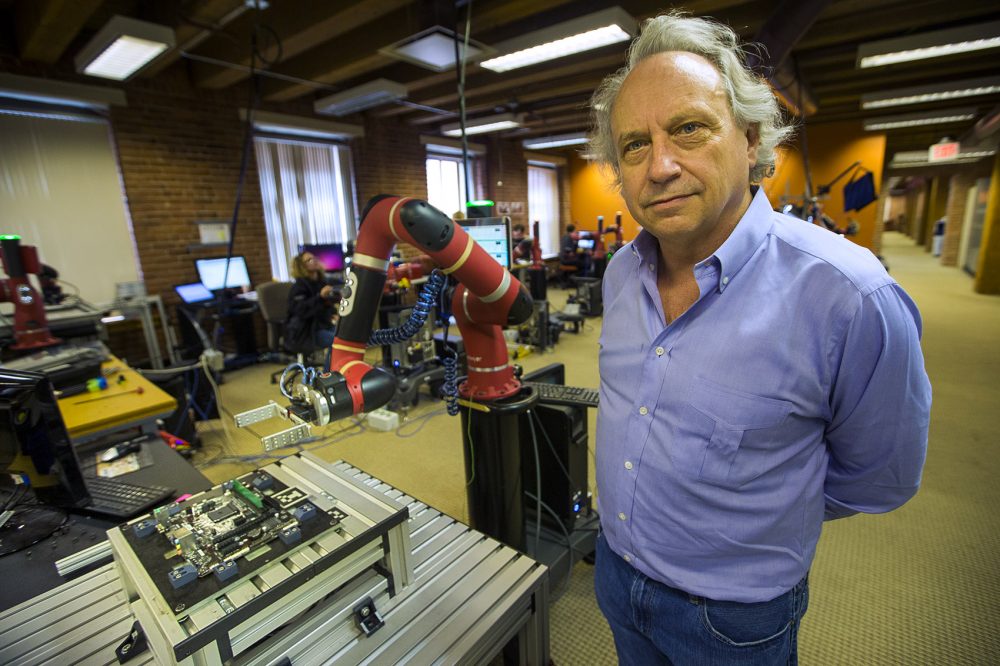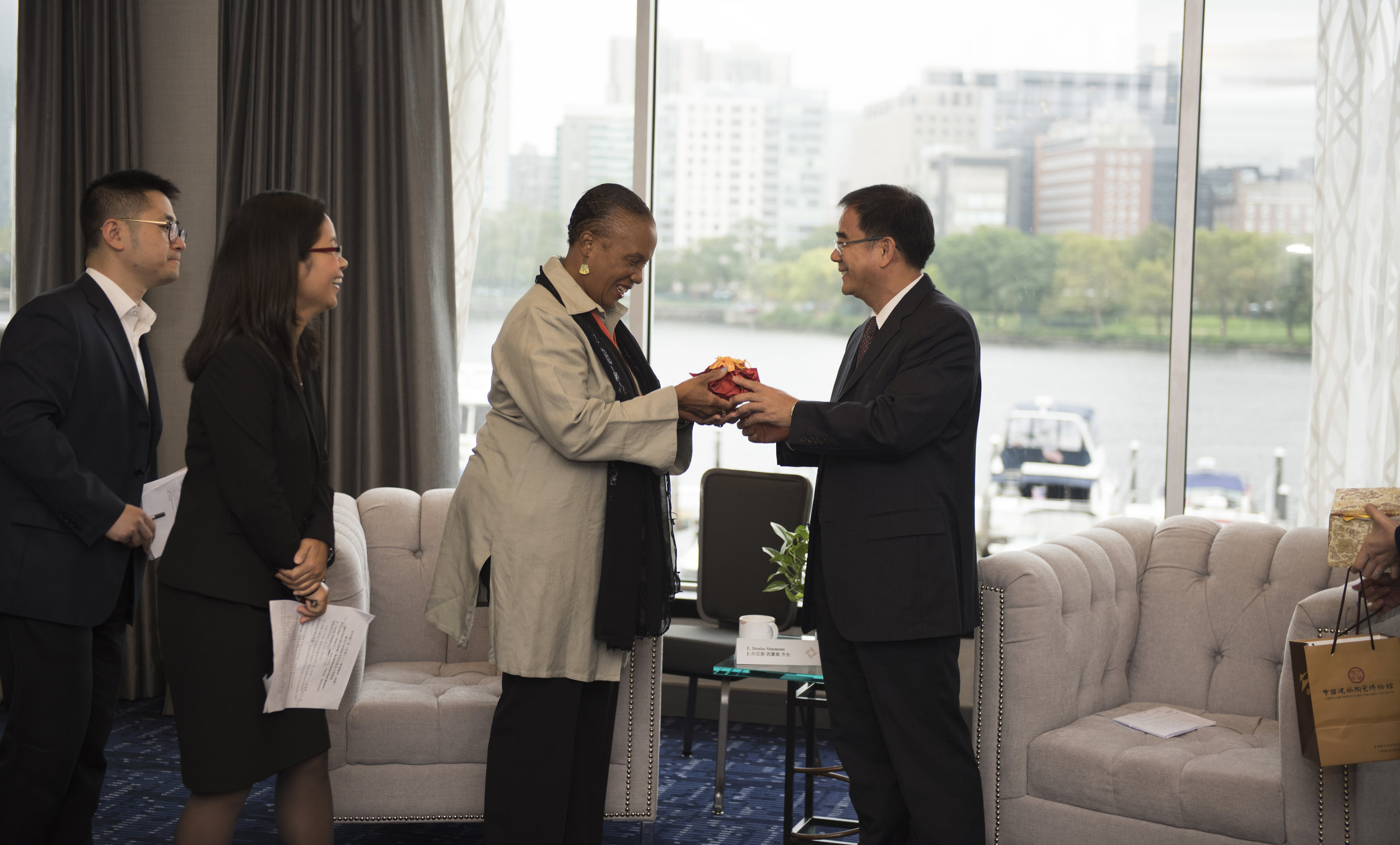This story originally appeared on wbur.org
Part 2 of a two-part series. Here's Part 1.
Rodney Brooks is a "robot guy" with white wavy hair and an Australian accent that's hard to miss.
He has spent his entire career working on robots and artificial intelligence. He co-founded iRobot, which manufactures the Roomba vacuum cleaner in China.
But by around 2004, Brooks says he'd "noticed that labor wasn't as plentiful as it had been in China."
He says the country's one-child policy had devastated China's labor pool — and continues to hurt it. By 2040, China's workforce is expected to shrink by 90 million people, according to the World Bank.
"Everyone thinks China has an infinite supply of labor, but it doesn't," Brooks says.
He realized that cheap labor in China wasn't going to be around forever. "There was gonna be some disruption worldwide in manufacturing, which is one of the reasons I started this company," he said.
The company he's referring to is his latest venture: Rethink Robotics. It makes intelligent robots that can be used for simple repetitive manufacturing tasks.
Brooks says his first robot was designed for the United States market, but then he created a smaller robot called Sawyer — it's a red arm with grippers — and he took Sawyer to China.
"We saw that there was a labor shortage in China, and electronics manufacturing was not gonna move away from China, no matter what anyone says. So we went to where the market is," Brooks says.
A Big Deal In Beijing
Sawyer, a Rethink robotic arm, makes coffee for visitors at the World Robot Conference in Beijing. Rethink Robotics began selling the robots in China in the summer of 2016. (Asma Khalid/WBUR)
The Rethink Robotics booth was a big attraction at the World Robot Conference in South Beijing in August, where Sawyer was putting together electronic equipment.
Every few minutes, a commercial blared out from the sound speakers, advertising the robot's flexibility and safety.
On the other side of the booth was a robot making coffee, and that's where we met Tina Tang, who was working for one of Rethink's China distributors called Hunan Cothink.
She said Rethink is targeting the 3C market -- that's short for computer, communication and consumer electronics.
"We started to officially sell the robots in June of last year," Tang says in Mandarin. "Since then [until September], we’ve sold around 400 machines."
She says Rethink has sold robots to Foxconn; Amazon; BYD, the car manufacturer; and Wasion, China's biggest gas and electric meter company. A spokesman with Rethink Robotics would not confirm this information. He says the company does not publicly disclose sales numbers, nor does it comment on individual customers by name (without their consent) as a policy.
Tang says each Rethink robot arm in China costs about $45,000 (U.S. dollars).
"The price tag is a challenge," Tang says, "because there are more and more local robotic companies emerging, and they offer a better price."
This point on price is something we heard from both a Chinese researcher and a consumer electronics CEO.
The other criticism we heard is that although Rethink robots are technologically advanced, they're not necessarily practical for a Chinese industrial factory.
A young boy looks intently at a Rethink robot picking up a circuit board at the World Robot Conference in Beijing. (Asma Khalid/WBUR)
But there is still a massive appetite for robots among Chinese manufacturers. And there are also now massive Chinese government subsidies for domestic robotic companies.
The Chinese government is pouring money into robotics and artificial intelligence. President Xi Jinping has an ambitious plan called MadeinChina2025; the goal is to turn his country into a hub for advanced manufacturing through automation.
Tang says this policy is great, and it'll help shine a spotlight on robotics.
"But comparatively speaking," she says, "because Rethink is a foreign brand, it won’t get the same strong support from the government as the local brands."
Still, U.S. companies want in to the Chinese market. And the Chinese want them to come.
Finding Customers In China
Back in Cambridge, on the second floor of an old building in Central Square, there's a venture capital firm called InTeahouse.
The Boston-area is home to many VC firms, but this one is unusual.
Xin Liu runs InTeaHouse, and she grew up in Beijing. And her mission with this firm is to build a global network that revolves around China.
"If you need to raise money, if you need to find the market, if you need to find [a] partner in [a] China factory, we help you," she says.
This fall, for the second year in a row, InTeaHouse took about a dozen Massachusetts robotics companies on a tour through China to meet investors, customers and business partners.
Because while selling automation in America isn't always easy, in China finding eager customers seems to be no problem.
This story was made possible by the Bringing Home the World International Reporting Fellowship Program for Minority Journalists at the International Center for Journalists (ICFJ).
Lusha Chen contributed to the reporting of this story.







